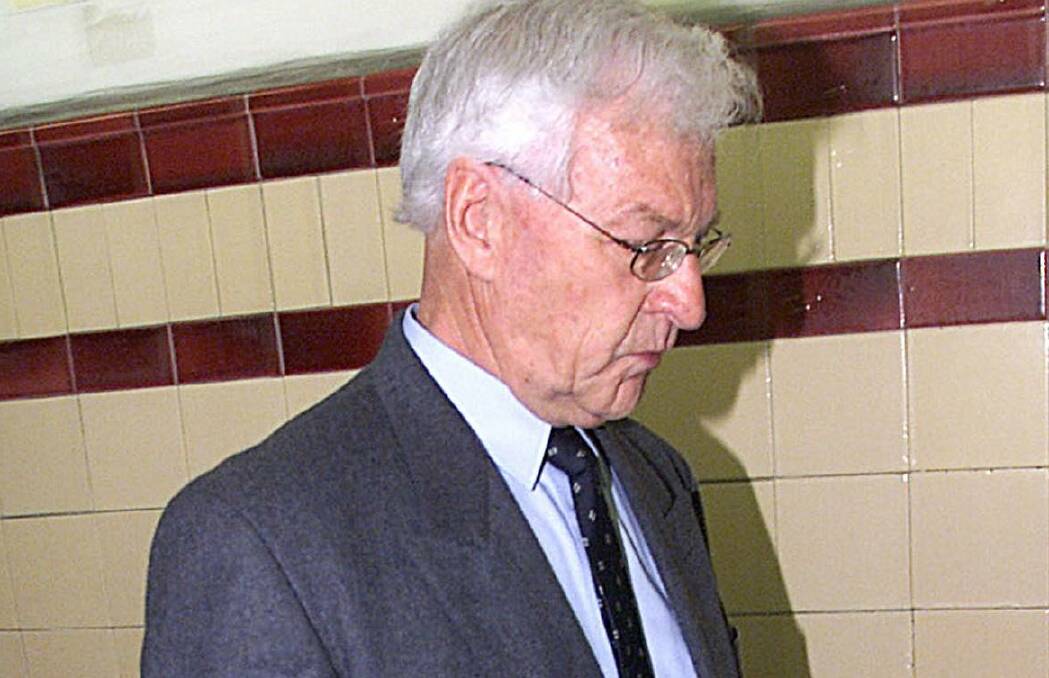
A jury had no right to award $1.3 million in exemplary damages to the victim of paedophile ex-Albury priest Vincent Kiss because there was no evidence the bishop was aware of the abuse.
Subscribe now for unlimited access.
or signup to continue reading
Counsel for the Catholic Diocese of Wagga argued in the Victorian Supreme Court that the jury also did not have the legal power to do so.
Barrister Roisin Annesley, KC, representing Bishop Mark Edwards, submitted to Justice Stephen O'Meara in Melbourne on Friday, November 17, that the plaintiff "ought not be permitted to go round the provisions" of the relevant legislation.
"To do so we say is to make a mockery of the statute that clearly precludes exemplary damages for negligence."
A six-member jury's awarded the victim, known only as TJ, $1.1 million for pain and suffering and $965,000 for loss of earnings following a recent civil trial, as well as the exemplary damages.
The verdict represented the first from a jury against the Catholic church in Australia, as well as the first awarding of punitive damages.
The church said TJ was only entitled to $250,000 for pain and suffering suffered at the hands of Kiss over two years in the early 1970s, beginning when he was in Year 9 and including an incident at Lake Hume.
In other news
At the time, Kiss was youth director of the Wagga diocese, having also served at Sacred Hearth church in North Albury in the mid-1960s
Kiss, now 91, was sentenced to more than 10 years' jail by the District Court in 2002 on 13 charges of assaulting four youths aged 13 to 17.
Before his incarceration he garnered a high-profile presence in Melbourne's high society, with a penchant for the arts.
The $3.3 million sum awarded by the jury could grow once accrued interest on that amount is calculated.
Justice O'Meara gave counsel a further week, to Friday, November 24, to complete submissions in support of the amount of interest that should be applied.
He will also issue his final orders on Friday, or possibly early the following week.
"Your honour," Ms Annesley said, on beginning her submission, "the parties have not resolved interest and there is an issue whether it's a matter of substantive law or it's a matter or procedural law.
"We have not had the opportunity to discuss that ... it may be that we come before your honour about that, but at the moment we're still in discussions."
On the jury's decision, Ms Annesley said the court ought not be satisfied there was a basis in law for it to award exemplary damages.
Ms Annesley said the only evidence for the complaint was that it was made to a priest in the diocese.
"There is no more. There's no evidence that the bishop knew of the complaint, there's no evidence as to the role of (that priest) at all, there's no evidence that the defendant had acted in deliberate, reckless or in ... disregard of the plaintiff's rights."
Ms Annesley also sharply criticised part of the final address to the jury by the victim's barrister, Jonathan Brett, KC, in which he accused the church of playing "word games".
"We reject that entirely," she said. "The submission is particularly extraordinary in circumstances where the defendant had at all times admitted that Kiss was charged and pleaded guilty."
Ms Annesley said a key issue was that any finding for damages rested on the question of "what the evidence is before the jury".
"We say that the mere admission of the complaint without anything more could not properly form the basis for inferential reasoning that the bishop knew about the complaint or that he failed to act upon it," she said.
"The test requires an analysis of the evidence and the evidence is insufficient to warrant a finding as required."
But Mr Brett submitted that case law directed that a jury verdict should be set aside "in only the clearest of circumstances".
"It's our submission that these are by no means the clearest of circumstances," he said.
"We went to the jury only on the basis of the facts that were admitted.
"And all of the arguments presented by our learned friend (Ms Annesley) were arguments that the jury had presented to it could consider, did consider, and it came to its award.
"In our respectful submission, that's really the be-all and end-all of it.
"They were taken exactly to the evidence and to nothing but the evidence and formed their opinion."
Mr Brett put to Justice O'Meara that the Kiss had agreed, with his guilty pleas, that the abuse occurred.
"And what's more, the diocese had acted on that by making a compensation payment at an earlier time," he said.
"And so there was complete agreement between the perpetrator and the victim that the abuse had occurred."
Mr Brett said there was nothing in Ms Annesley's final submissions, nor in his, that went outside the evidence.
"Your honour gave very clear and very appropriate directions, to which no exception was taken," he said.
"And it's our respectful submission the jury verdict should stand."
Our journalists work hard to provide local, up-to-date news to the community. This is how you can continue to access our trusted content:
- Download our app from the Apple Store or Google Play
- Bookmark dailyadvertiser.com.au
- Follow us on Twitter
- Follow us on Instagram
- Follow us on Google News
- Make sure you are signed up for our breaking and regular headlines newsletters















